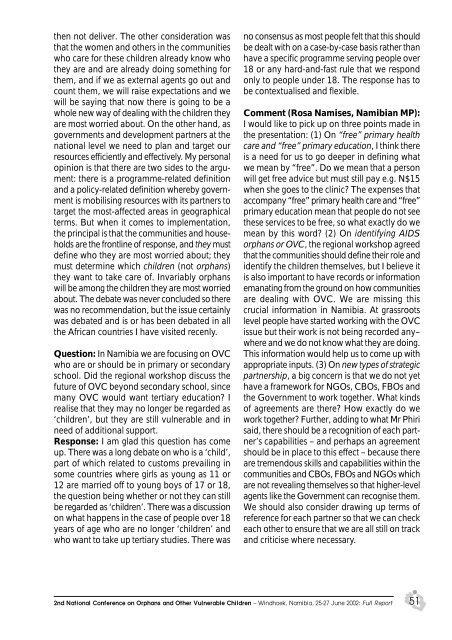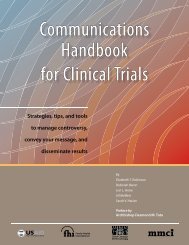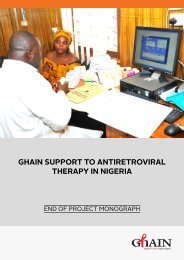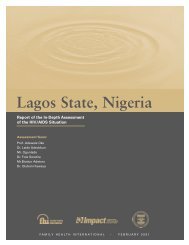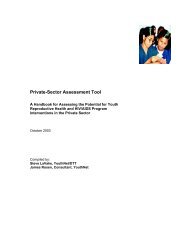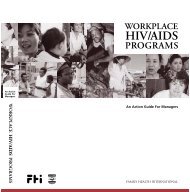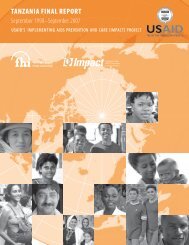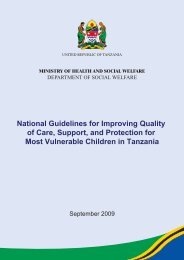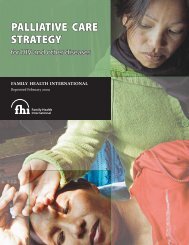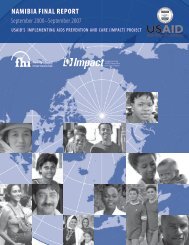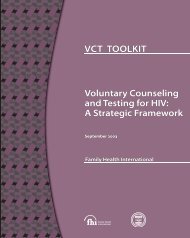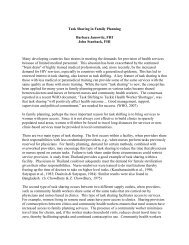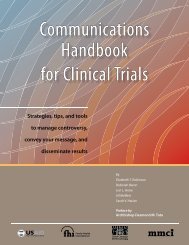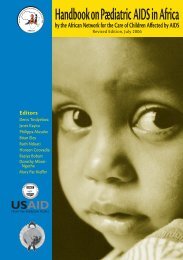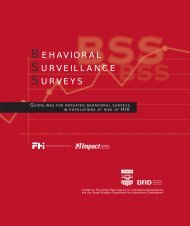2nd National Conference on Orphans and Other ... - FHI 360
2nd National Conference on Orphans and Other ... - FHI 360
2nd National Conference on Orphans and Other ... - FHI 360
You also want an ePaper? Increase the reach of your titles
YUMPU automatically turns print PDFs into web optimized ePapers that Google loves.
then not deliver. The other c<strong>on</strong>siderati<strong>on</strong> was<br />
that the women <strong>and</strong> others in the communities<br />
who care for these children already know who<br />
they are <strong>and</strong> are already doing something for<br />
them, <strong>and</strong> if we as external agents go out <strong>and</strong><br />
count them, we will raise expectati<strong>on</strong>s <strong>and</strong> we<br />
will be saying that now there is going to be a<br />
whole new way of dealing with the children they<br />
are most worried about. On the other h<strong>and</strong>, as<br />
governments <strong>and</strong> development partners at the<br />
nati<strong>on</strong>al level we need to plan <strong>and</strong> target our<br />
resources efficiently <strong>and</strong> effectively. My pers<strong>on</strong>al<br />
opini<strong>on</strong> is that there are two sides to the argument:<br />
there is a programme-related definiti<strong>on</strong><br />
<strong>and</strong> a policy-related definiti<strong>on</strong> whereby government<br />
is mobilising resources with its partners to<br />
target the most-affected areas in geographical<br />
terms. But when it comes to implementati<strong>on</strong>,<br />
the principal is that the communities <strong>and</strong> households<br />
are the fr<strong>on</strong>tline of resp<strong>on</strong>se, <strong>and</strong> they must<br />
define who they are most worried about; they<br />
must determine which children (not orphans)<br />
they want to take care of. Invariably orphans<br />
will be am<strong>on</strong>g the children they are most worried<br />
about. The debate was never c<strong>on</strong>cluded so there<br />
was no recommendati<strong>on</strong>, but the issue certainly<br />
was debated <strong>and</strong> is or has been debated in all<br />
the African countries I have visited recenly.<br />
Questi<strong>on</strong>: In Namibia we are focusing <strong>on</strong> OVC<br />
who are or should be in primary or sec<strong>on</strong>dary<br />
school. Did the regi<strong>on</strong>al workshop discuss the<br />
future of OVC bey<strong>on</strong>d sec<strong>on</strong>dary school, since<br />
many OVC would want tertiary educati<strong>on</strong>? I<br />
realise that they may no l<strong>on</strong>ger be regarded as<br />
‘children’, but they are still vulnerable <strong>and</strong> in<br />
need of additi<strong>on</strong>al support.<br />
Resp<strong>on</strong>se: I am glad this questi<strong>on</strong> has come<br />
up. There was a l<strong>on</strong>g debate <strong>on</strong> who is a ‘child’,<br />
part of which related to customs prevailing in<br />
some countries where girls as young as 11 or<br />
12 are married off to young boys of 17 or 18,<br />
the questi<strong>on</strong> being whether or not they can still<br />
be regarded as ‘children’. There was a discussi<strong>on</strong><br />
<strong>on</strong> what happens in the case of people over 18<br />
years of age who are no l<strong>on</strong>ger ‘children’ <strong>and</strong><br />
who want to take up tertiary studies. There was<br />
no c<strong>on</strong>sensus as most people felt that this should<br />
be dealt with <strong>on</strong> a case-by-case basis rather than<br />
have a specific programme serving people over<br />
18 or any hard-<strong>and</strong>-fast rule that we resp<strong>on</strong>d<br />
<strong>on</strong>ly to people under 18. The resp<strong>on</strong>se has to<br />
be c<strong>on</strong>textualised <strong>and</strong> flexible.<br />
Comment (Rosa Namises, Namibian MP):<br />
I would like to pick up <strong>on</strong> three points made in<br />
the presentati<strong>on</strong>: (1) On “free” primary health<br />
care <strong>and</strong> “free” primary educati<strong>on</strong>, I think there<br />
is a need for us to go deeper in defining what<br />
we mean by “free”. Do we mean that a pers<strong>on</strong><br />
will get free advice but must still pay e.g. N$15<br />
when she goes to the clinic? The expenses that<br />
accompany “free” primary health care <strong>and</strong> “free”<br />
primary educati<strong>on</strong> mean that people do not see<br />
these services to be free, so what exactly do we<br />
mean by this word? (2) On identifying AIDS<br />
orphans or OVC, the regi<strong>on</strong>al workshop agreed<br />
that the communities should define their role <strong>and</strong><br />
identify the children themselves, but I believe it<br />
is also important to have records or informati<strong>on</strong><br />
emanating from the ground <strong>on</strong> how communities<br />
are dealing with OVC. We are missing this<br />
crucial informati<strong>on</strong> in Namibia. At grassroots<br />
level people have started working with the OVC<br />
issue but their work is not being recorded any–<br />
where <strong>and</strong> we do not know what they are doing.<br />
This informati<strong>on</strong> would help us to come up with<br />
appropriate inputs. (3) On new types of strategic<br />
partnership, a big c<strong>on</strong>cern is that we do not yet<br />
have a framework for NGOs, CBOs, FBOs <strong>and</strong><br />
the Government to work together. What kinds<br />
of agreements are there? How exactly do we<br />
work together? Further, adding to what Mr Phiri<br />
said, there should be a recogniti<strong>on</strong> of each partner’s<br />
capabilities – <strong>and</strong> perhaps an agreement<br />
should be in place to this effect – because there<br />
are tremendous skills <strong>and</strong> capabilities within the<br />
communities <strong>and</strong> CBOs, FBOs <strong>and</strong> NGOs which<br />
are not revealing themselves so that higher-level<br />
agents like the Government can recognise them.<br />
We should also c<strong>on</strong>sider drawing up terms of<br />
reference for each partner so that we can check<br />
each other to ensure that we are all still <strong>on</strong> track<br />
<strong>and</strong> criticise where necessary.<br />
<str<strong>on</strong>g>2nd</str<strong>on</strong>g> <str<strong>on</strong>g>Nati<strong>on</strong>al</str<strong>on</strong>g> <str<strong>on</strong>g>C<strong>on</strong>ference</str<strong>on</strong>g> <strong>on</strong> <strong>Orphans</strong> <strong>and</strong> <strong>Other</strong> Vulnerable Children – Windhoek, Namibia, 25-27 June 2002: Full Report<br />
51


